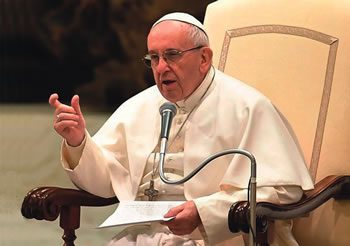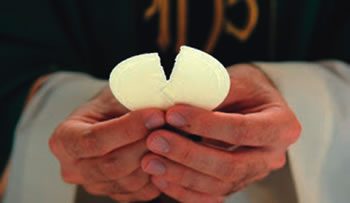The Our Father and the Breaking of the Bread
 A summary of the General Audience March 14
A summary of the General Audience March 14
In the Last Supper, after Jesus took the bread and the chalice of the wine, and gave thanks to God, He “broke the bread.” In the Eucharistic Liturgy of the Mass, the breaking of the Bread corresponds to this action, preceded by the prayer that the Lord taught us, namely, the “Our Father.”
The Our Father
And so we begin the rite of Communion, prolonging the praise and supplication of the Eucharistic Prayer with the recitation of the “Our Father.” This isn’t one of the many Christian prayers, but THE prayer of the children of God; it’s the great prayer that Jesus taught us. In fact, consigned to us on the day of our Baptism, the “Our Father” makes resound in us the same sentiments that were in Christ Jesus - we pray as Jesus prayed. It’s so good to pray like Jesus!
Formed by His divine teaching, we dare to address God calling Him “Father,” because we are reborn as His children through water and the Holy Spirit (Cf. Ephesians 1:5). No one, in truth, would be able to call Him familiarly “Abba”—“Father” — without being generated by God, without the inspiration of the Spirit, as Saint Paul teaches (Cf. Romans 8:15). We must think: no one can call Him “Father” without the inspiration of the Spirit. So often people say the “Our Father,” but don’t know what they say. Because yes, He is the Father, but when you say “Father” do you feel He is Father, your Father, Father of humanity, Father of Jesus Christ? Do you have a relationship with this Father?
Disposed for Communion
What better prayer, than that taught by Jesus, can dispose us to sacramental Communion with Him?
In the Lord’s Prayer we ask for our “daily bread,” in which we make a particular reference to the Eucharistic Bread, which we need to live as children of God. We also implore “the forgiveness of our trespasses,” and to be worthy to receive God’s forgiveness, we commit ourselves to forgive those that have offended us. And this isn’t easy; it’s a grace we must request: “Lord, teach me to forgive as you have forgiven me.” We can’t forgive with our own strength; to forgive is a grace of the Holy Spirit. So, while we open our heart to God, the “Our Father” disposes us also to fraternal love. Finally, we also ask God to “deliver us from evil,” which separates us from Him and divides us from each other. We understand well that these are very apt requests to prepare us for Holy Communion
The Rite of Peace
What we request in the “Our Father,” is echoed by the priest who prays: “Deliver us, O Lord, from all evils and grant peace in our days.” And then it receives a sort of seal in the rite of peace: invoked from Christ first of all, is the gift of his peace (Cf. John 14:27)) – so different from that of the world – it makes the Church grow in unity and in peace, according to His will; then, with the concrete gesture exchanged between us, we express “ecclesial communion and mutual love before communing with the Sacrament” (Roman Missal, OGMR, 82).
The Sign of Peace
In the Roman Rite the exchange of the sign of peace, has been placed since antiquity before Communion. As St Paul reminds us, it’s not possible to commune with the one Bread, which renders us one Body in Christ, without recognizing ourselves pacified by fraternal love (Cf. 1 Corinthians 10:16-17; 11:29). The peace of Christ can’t root itself in a heart incapable of living fraternity and of recomposing it after having wounded it.
The Breaking of the Bread
 The gesture of peace is followed by the breaking of the Bread. Carried out by Jesus during the Last Supper, the breaking of the Bread is the revealing gesture that enabled the disciples to recognize Him after His Resurrection. The breaking of the Eucharistic Bread is accompanied by the invocation of the “Lamb of God,” figure with which John the Baptist indicated Jesus “He who takes away the sin of the world” (John 1:29). In the Eucharistic Bread, broken for the life of the world, the praying assembly recognizes the true Lamb of God and begs Him: “Have mercy on us . . . grant us peace.” -Invocations that, from the “Our Father” prayer to the breaking of the Bread, help us to dispose our spirit to take part in the Eucharistic feast.
The gesture of peace is followed by the breaking of the Bread. Carried out by Jesus during the Last Supper, the breaking of the Bread is the revealing gesture that enabled the disciples to recognize Him after His Resurrection. The breaking of the Eucharistic Bread is accompanied by the invocation of the “Lamb of God,” figure with which John the Baptist indicated Jesus “He who takes away the sin of the world” (John 1:29). In the Eucharistic Bread, broken for the life of the world, the praying assembly recognizes the true Lamb of God and begs Him: “Have mercy on us . . . grant us peace.” -Invocations that, from the “Our Father” prayer to the breaking of the Bread, help us to dispose our spirit to take part in the Eucharistic feast.
 Entries(RSS)
Entries(RSS)